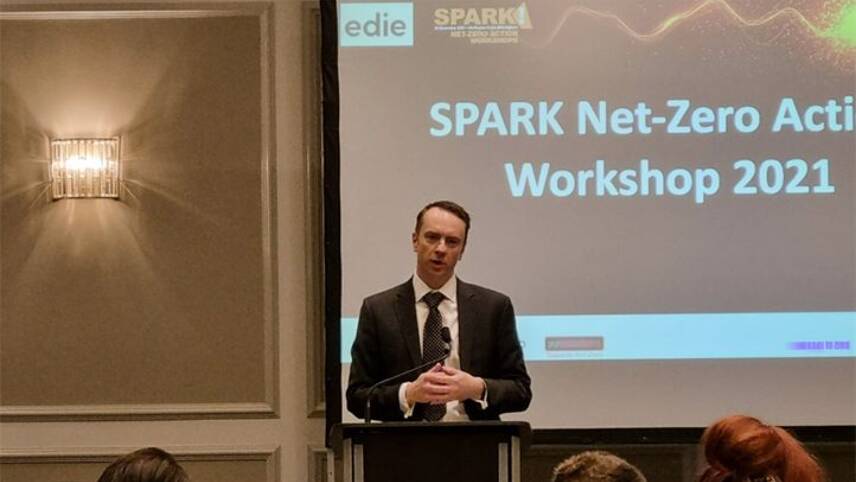Register for free and continue reading
Join our growing army of changemakers and get unlimited access to our premium content

Thompson reflected on what COP26 means for sustainable business in the coming years
Thompson delivered the keynote address at edie’s SPARK! Net-Zero Action Workshops in Birmingham this morning (30 November) – an event hosted to convene energy and carbon leaders in collaborating and co-creating solutions to the most pressing decarbonisation challenges.
Reflecting on COP26, which concluded in Glasgow on 13 November, Thompson said: “I think everyone will have a different view on whether COP26 was successful. What I will say is that there was certainly progress made.
“When you look at some of the key commitments – the commitment on the phase-out of coal and the first mention of fossil fuels in an agreement coming out of a COP, which seems really odd, but is a real step forward.
“When we reflect on whether the event itself was a success, I think there’s always a focus on having a big global target – that this is the definition. I’d argue – and, certainly, others have said the same – that the time for setting big, bold targets is gone, and that the focus is actually on how we are going to deliver.”
“A lot of action, planning and delivery comes outside of the COP process. It is just two weeks out of every year. It loops into the year-round discussions we have, and the actions we need to take in the roles that we have now.”
National Grid was notably a Principal Partner of COP26 – the highest level of corporate sponsorship for the summit.
Looking at the progress which energy, sustainability, carbon and environment professionals will need to help drive in the coming years, Thompson said action will need to move from a “jog” to a “sprint”, arguing that how businesses position sustainability
He summarised: “We’ve definitely moved on from target-setting. A few years ago, we’d be asked whether we had a net-zero target and told it was great that we did. Actually, that’s just an expectation now.
“Now, we are asked: What does your action plan look like? What does your roadmap look like? Is that roadmap aligned with the science? Is it aligned to the broader trajectories we’re seeing from the Climate Change Committee (CCC) here in the UK, or from the Intergovernmental Panel on Climate Change (IPCC)?
“These are the questions we really need to be asking ourselves…. And we need to be ensuring that the actions are aligned to our business strategy, so that they are not seen as separate. We’re not just achieving net-zero and reducing emissions on the side – our core business will need to be completely different.”
To this latter point, Thompson said businesses should expect key stakeholders to scrutinise their future capital investment plans through an environmental sustainability lens.
Energy systems focus
Zooming in, Thompson chronicled progress to date and key remaining hurdles in decarbonising electricity, transport and heating systems across the UK.
He called the decarbonisation of electricity systems so far “a really positive story” of “rapid progress”, with emissions from generation down by two-thirds over the past seven years. But he noted that further acceleration will be needed – and will likely be more challenging. The UK Government recently confirmed a new vision to move away from all unabated fossil-fuel-powered electricity generation by 2035.
In transport, he said, while less progress has been made, “clear policy goals” to support transformation are welcome. These include the 2030 ban on new petrol and diesel car sales and the plans to phase out petrol and diesel HGVs through to 2040. The remaining challenges, in Thompson’s opinion, include charging infrastructure delivery and scaling networks to match supply with growing demand. Nonetheless, he said he was “absolutely” certain that the grid will be able to cope with growing demands, as long as off-peak charging is properly incentivised.
Thompson dubbed heat one of the biggest remaining hurdles to net-zero in the UK, calling the installation of technologies including heat pumps and hydrogen a “challenge of cost, a challenge of technology and a challenge of the potential levels of disruption that come with changing our existing infrastructure for new infrastructure”.
Getting more than 20 million homes off of gas heating, as well as millions of UK businesses, he admitted, will likely need more action than what is included in the Heat and Buildings Strategy. The Strategy was welcomed after long delays, but many in the green economy were hoping for more clarity on hydrogen for heating and for more funding for business decarbonisation.
Want to join edie’s Net-Zero Leaders Club?
The SPARK! workshops are an annual event, hosted for members of edie’s Net-Zero Leaders Club exclusively.
Established in 2018 and revamped in 2021, the Net-Zero Leaders Club is trusted by more than 300 UK-based professionals who are leading and/or implementing their organisation’s net-zero carbon and energy management strategy.
The Club helps members stay ahead of the curve and achieve net-zero goals through exclusive editorial and data-led insights, CPD-certified briefings and workshops, and regular networking sessions (live and virtual).
Click here for more information and to sign up.
Sarah George


The decarbonisation of electricity has been with us for decades; the answer is nuclear.
But it is not popular, in spite of its safety record and total freedom from emission of CO2.
We were looking at nuclear power systems when I joined the UKKAEA in 1955.
Sounds like ancient history now!
Richard Phillips